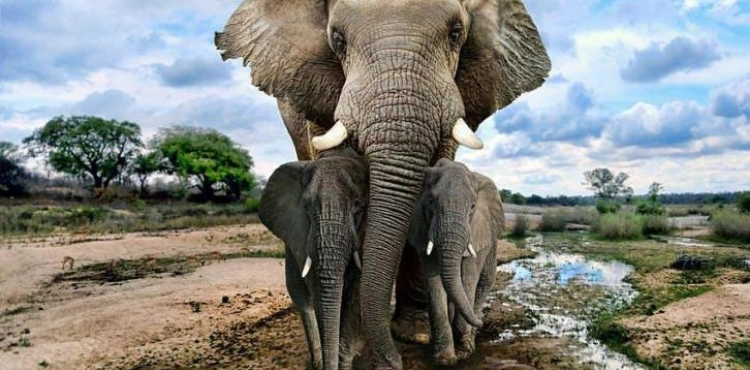If bites of elephants in Kenya survive over poaching, spears and droughts, then an unexpected new phenomenon threatens them, represented in the growing demand for avocados.
Shortly after dawn, the elephant "Tolstoy", with its gigantic skeleton and napkin almost touching the ground, looks inside the Kenyan Amboseli Park at the foot of Mount Kilimanjaro, where it has lived amid wild nature for nearly half a century.
It has withstood years of illegal poachers and droughts, but the biggest threat to it is the growing demand for avocados.
A 73-hectare farm near the famous Amboseli Park, which is packed with many species of wildlife, is the focus of a court battle.
The farm’s opponents, who are property owners and environmental groups, contend that the farm impedes the mobility of elephants and conflicts with the historical use of these lands.
However, the financiers of the farm deny this, stressing that it does not threaten wild animals in the place and, in return, provides essential jobs in unused lands.
The destruction of natural habitats and agricultural lands, along with illegal hunting, is one of the main reasons for the significant decline in the number of African elephants, according to warnings issued by the International Union for Conservation of Nature, a prominent non-governmental organization active in preserving biodiversity, in a report issued Thursday.
African elephants are now on the FAO "red list" of species facing extinction.
The jungle elephants, a genus near Amboseli, have been classified as "threatened" with extinction, after their numbers have decreased by at least 60% during the last 50 years.
Forest elephants, especially in central and western Africa, are now classified within the list of species facing "an extreme risk of extinction."
Kenya ranks high on the list of avocado exporting countries, and its exports have increased dramatically with the growing passion for this type of "superfood", which has become an important ingredient on food menus around the world.
Kenya ranks sixth on the list of countries that export the most avocados to Europe, and these exports increased by 33% to reach $ 127 million in October 2020, according to the country´s Fresh Products Exporters Association.
During this exceptional year, Kelly Avu Fresh Limited obtained permission from the National Environmental Management Authority (NEMA) to establish its farms on land sold by people from the Maasai ethnic group.
The crops were removed from the ground, then fenced, and then equipped with solar panels and a nursery with excavations to exploit the groundwater.
He reminds landowners in neighboring areas and environmental groups that large-scale farming is forbidden here under the area´s land use plans.
In September, the "NEMA" Authority, according to a pressure campaign, ordered the "Kelly Avo" company to suspend its activities pending the completion of the examination of the file. The company has appealed the decision to the Environmental Court in Kenya, which is currently hearing the case.
Cultivations continue in place. On a March morning, tractors were noticed plowing the land, while agricultural workers watered the young avocado trees.
Despite the prosperity of its activities, the volume of avocado cultivation remains limited in Kenya compared to tourism, which generated $ 1.6 billion for the African country in 2019.
However, farm manager Jeremiah Shwaka Salash, who is also a shareholder in "Kelly Avo", confirms that this agricultural project "saved" many employees in the tourism sector after they lost their jobs due to the closure measures during the Covid-19 pandemic.
"I defend the idea of ​​the possibility of coexisting with wild animals and obtaining another source of income," explains Salash, who is from the region and belongs to the Maasai ethnic group, noting that there is a larger farm of fruits and vegetables nearby.
As for the owners of neighboring lands and experts in wildlife, they have a decisive position: there is no possibility of coexistence between the two.
They warn that avocado cultivation consumes large quantities of irrigation water and threatens this ecosystem, which is on the UNESCO World Heritage List, which is already facing recurring droughts.
The elephants also collided with the electric fence set by "Kelly Avo", in their opinion, evidence of his presence on the routes that the elephants take when leaving Amboseli to breed or to search for water or pastures.
"Can you imagine elephants dying in Amboseli for Europeans to eat avocados?" Says Paula Kahombo, who runs the non-governmental organization Wildlife Direct.
Opponents of the project point out that allowing "Kelly Avo" to continue its activities would lead to a dangerous precedent, as other parties seek to exploit these lands.
Tolstoy and his companions, the 2,000 elephants in this ecosystem, are already encountering vehicles crossing the Kemana Sanctuary, a mandatory passage between the various parks.
"If the situation continues as it is, the Amboseli National Park will disappear," says Daniel Ole Sampo of the local NGO Big Life Foundation.
"These elephants (...) will leave, and that will be the end of the park and the collapse of tourism in the region," he added.
The majority of the inhabitants of the Maasai ethnic group in the vicinity of the "Kili Avo" farm have made their lands private open reserves where wild animals and livestock can move freely.
"If we win (" Kelly Avo "the lawsuit), our reserves will be lost and the Masai crops will be lost," says the official in charge of an association of 342 landowners in the vicinity of "Kelly Avo".
According to Paula Kahombo, commercial farming in Kenya is "much more dangerous to animals than illegal hunting".
It also calls on foreign distributors to inquire about the origin of the foods they buy, such as the British giant, Tesco, which cut ties with a large Kenyan avocado farm in October over accusations of employee abuse.
"It is not possible to establish an avocado farm in such a wilderness area," she asserts.












